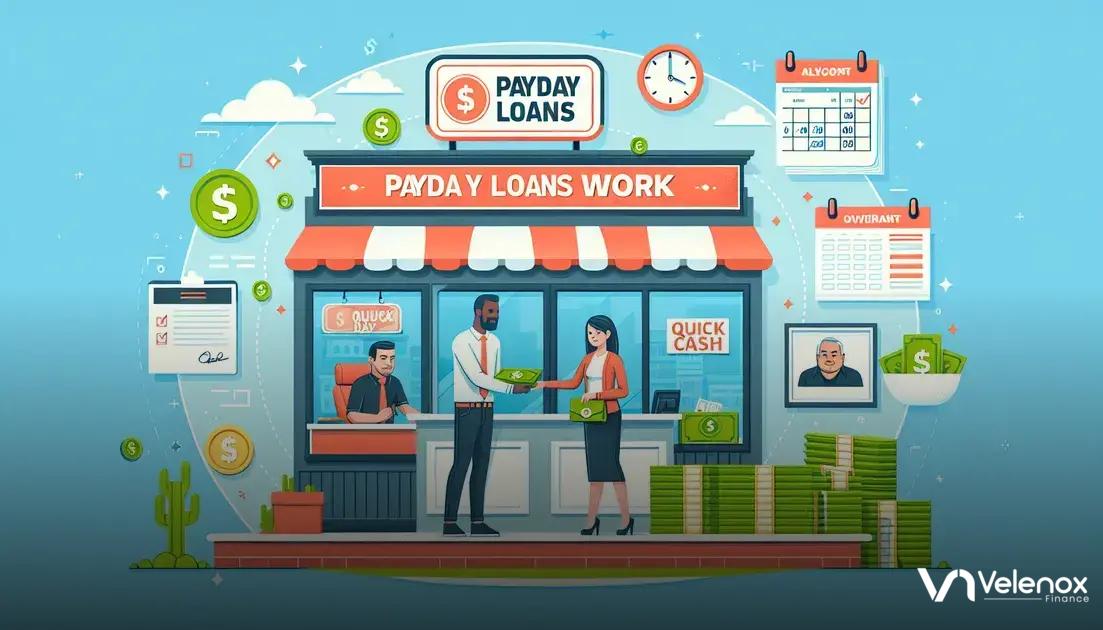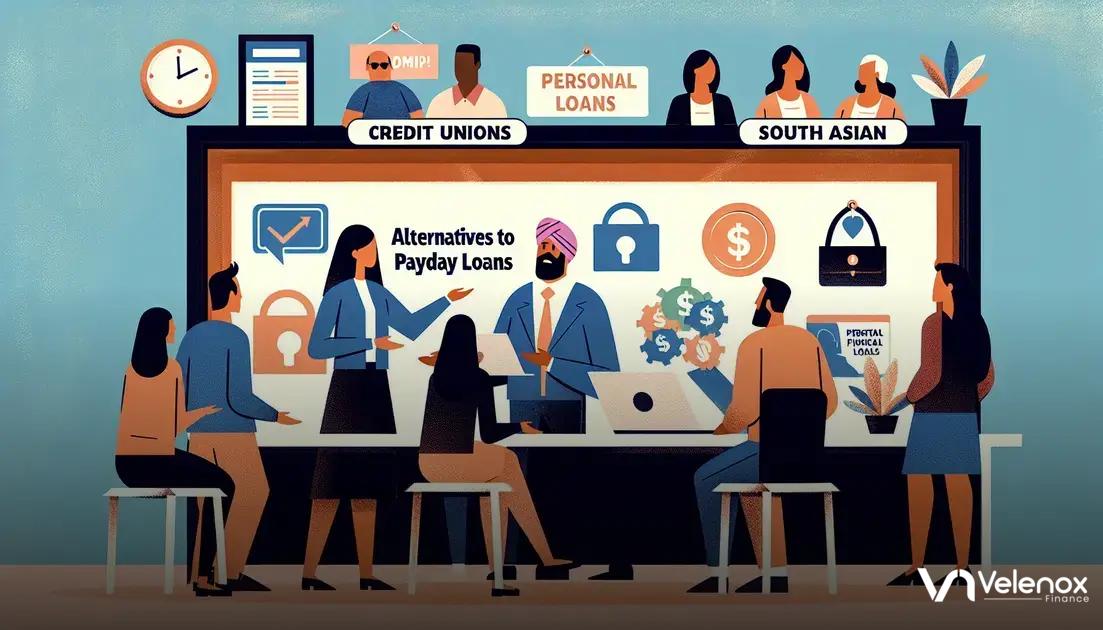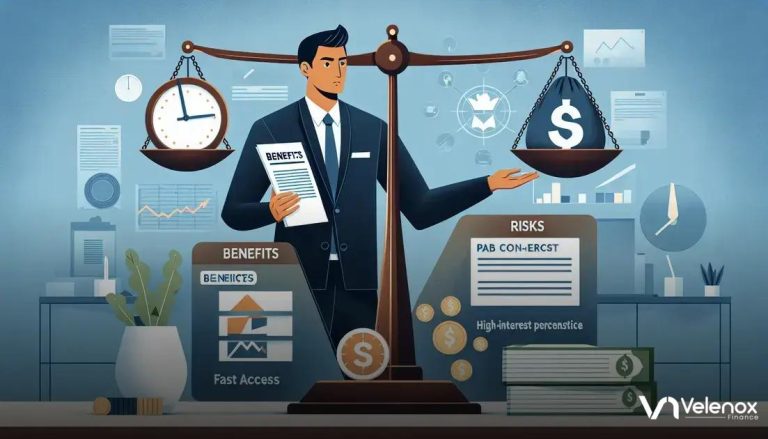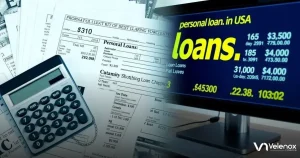Payday loans provide a quick way to get money when you need it urgently. However, it’s important to understand both the benefits and the risks involved.
What are payday loans?
Payday loans are short-term, high-interest loans designed to help individuals cover their expenses until they receive their next paycheck. These loans are typically small, ranging from $100 to $1,500, and are intended to be repaid quickly, usually within two to four weeks.
One key feature of payday loans is their accessibility. They are often available to individuals with poor credit or no credit history, making them an attractive option for those who might not qualify for traditional bank loans. Additionally, the application process is usually quick and straightforward, often requiring little more than proof of income, an active bank account, and valid identification.
Interest rates and fees associated with payday loans can be quite high, making them expensive. The annual percentage rate (APR) for payday loans can reach 400% or more, compared to lower rates for traditional loans. Due to these high costs, borrowers should carefully consider their ability to repay the loan on time to avoid falling into a cycle of debt.
ADVERTISEMENT
Payday loans can be useful for urgent financial needs, such as unexpected car repairs, medical bills, or other emergencies. However, it is crucial to understand the terms and conditions of the loan, including all fees and repayment schedules, to make an informed decision.
How payday loans work

Payday loans are short-term loans usually due by your next paycheck. These loans are typically for small amounts, often ranging from $100 to $500. They are designed to assist individuals who need immediate financial assistance and lack access to conventional credit.The process is quite simple. First, you apply either online or at a storefront payday lender. You often need to provide personal information, such as proof of income and a valid ID. Some lenders may also ask for a post-dated check or authorization to electronically withdraw funds from your bank account.
Approval and Funding
Once your application is approved, you receive funds either as cash or a deposit into your bank account. Repayment is typically due on your next payday. The lender will either cash your post-dated check or withdraw the amount owed, plus any fees, directly from your account.
It’s important to note that payday loans come with higher interest rates and fees compared to traditional loans. This makes them a costly form of borrowing. If you cannot repay the loan on time, you might have the option to roll over the loan, which involves paying additional fees and extending the repayment period.
Payday loans can offer quick access to cash but often come at a high cost. Understanding how these loans work can help you make informed decisions about your financial needs.
Pros and cons of payday loans
Pros of Payday Loans
Quick Access to Funds: One of the main benefits of payday loans is the speed at which you can get the money. If you need immediate cash for emergencies, these loans can be a lifesaver.
Easy to Qualify: Unlike traditional bank loans, payday loans have minimal eligibility criteria. Even individuals with poor credit scores can qualify, making it accessible to a broad audience.
No Credit Check: Most payday lenders do not perform a hard credit check, which means applying for a payday loan will not affect your credit score.
Cons of Payday Loans
High Interest Rates: Payday loans are notorious for their high interest rates and fees. The cost of borrowing can be significantly higher than traditional loans, making them a costly option.
Short Repayment Terms: Typically, payday loans need to be repaid by your next paycheck. This short repayment period can be challenging for borrowers, leading to a cycle of debt.
Potential for Debt Cycle: Due to the short repayment terms and high costs, many borrowers find themselves taking out additional payday loans to cover the initial loan, leading to a dangerous cycle of debt.
Alternatives to payday loans

Payday loans can be enticing for those needing quick cash, but there are several alternatives that may offer better terms and lower costs.
Personal Loans
Many credit unions and banks offer personal loans with lower interest rates and more manageable repayment schedules. Unlike payday loans, personal loans can be repaid over months or years, making them a viable option for large expenses.
Credit Card Cash Advances
Though often accompanied by high fees, credit card cash advances can still be cheaper than payday loans. Ensure you understand the terms and interest rates before choosing this option.
Borrowing from Family or Friends
Sometimes, the best alternatives come from those closest to you. Borrowing from family or friends might come with no interest or flexible repayment schedules. It’s important to treat this as a formal loan to avoid damaging personal relationships.
Paycheck Advances
Some employers offer paycheck advances, enabling you to access a portion of your earned wages early. These advances usually come with no fees and can be deducted from your next paycheck.
Local Charities and Nonprofits
Various organizations provide financial assistance to those in need. Research local options that offer support with bills, groceries, and other essentials.
Payment Plans
If your primary need for a payday loan is to cover bills, contact your service providers to negotiate payment plans. Many providers are willing to set up manageable payment schedules without additional fees.
Tips for responsible borrowing
When considering payday loans, it’s vital to borrow responsibly to avoid financial pitfalls. Here are some key tips:
- Assess Your Financial Situation: Before taking out a loan, evaluate your current finances to ensure you have the means to repay it on time.
- Borrow Only What You Need: Limit your loan amount to the essentials. Avoid borrowing more than you can handle.
- Understand the Terms: Familiarize yourself with the loan terms, interest rates, and fees. Read the fine print to avoid surprises.
- Create a Repayment Plan: Plan how you will repay the loan. Ensure the repayment fits within your budget to avoid late fees or further debt.
- Communicate with Your Lender: If you’re facing difficulties, contact your lender. They might offer extensions or other solutions to help you manage the loan.
Responsible borrowing practices help you reap the benefits of payday loans while minimizing potential risks. Stay informed and proactive in managing your finances.





